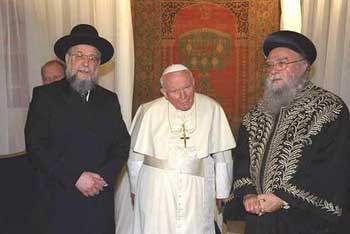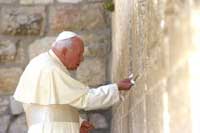Relations with Jews and Israel
John Paul II was born Karol Wojtyla on May 18, 1920,
in the Polish town of Wadowice, where he had Jewish friends and neighbors
and was an eyewitness to the Holocaust.
A few months before the war ended, Wojtyla rescued a starving 13-year-old
Jewish girl at a train station by carrying her to the rail car in which
he was traveling, feeding her and covering her with his coat. Later,
he would affect even more Jewish lives.
 |
While Wojtyla was a bishop, he took part in the historic
Second Vatican Council convened by Pope John XXIII, which modernized
aspects of church practice and doctrine. The Council also radically
changed the Church’s relationship with the Jewish people when
it issued the Nostra Aetate declaration in 1965, which cleared Jews of responsibility for the death
of Jesus, renounced
its traditional claim that Jews had been rejected by God, condemned anti-Semitism, and called for “mutual
understanding and respect” between Catholics and Jews. As Pope,
John Paul II would turn these words into actions.
After his election as pope in October 1978, John Paul
often devoted his energy to improving relations between Jews and Catholics.
He frequently met with Jewish leaders, repeatedly condemned anti-Semitism,
commemorated the Holocaust, and established diplomatic relations with Israel.
One of his first acts toward reconciliation occurred
during his visit to Poland in 1979 when he knelt and prayed at Auschwitz.
Seven years later, on April 13, 1986, he made an even more dramatic
trip, this one just across the Tiber River, to Rome’s Great Synagogue, becoming the first pope to visit a Jewish house of
worship. There he warmly embraced Rome’s chief rabbi, Elio Toaff,
and described Jews as the “elder brothers” of Christians.
“In his speech, everyone felt his love, his affection,”
Toaff recalled. “He made a tie between Judaism and Christianity and, in doing so, he found a way to move us all.’
On the 50th anniversary of the Warsaw
Ghetto uprising, Pope John Paul II issued this appeal:
As Christians and Jews, following the example of
the faith of Abraham, we are called to be a blessing to the world
(cf. Gen. 12:2 ff.). This is the common task awaiting us. It is therefore
necessary for us, Christians and Jews, to be first a blessing to one
another (L'Osservatore Romano, August 17, 1993).
 |
In
1994, John Paul established full diplomatic
ties between the Vatican and Israel.
He said, “For the Jewish people who live in the State of Israel
and who preserve in that land such precious testimonies to their history
and their faith, we must ask for the desired security and the due tranquillity
that are the prerogative of every nation . . .”
The Pope also was instrumental in the publication of “We Remember: A Reflection
on the Shoah,” the 1998 document expressing the Church's “deep
sorrow for the failures of her sons and daughters in every age.”
He visited Israel in 2000, publicly apologizing for the persecution of Jews by Catholics
over the centuries, including the Holocaust,
and depositing a note pleading for forgiveness in a crack in the Western
Wall.
While many of John Paul’s teachings about the
Jews have become official church policy, even he recognized that differences
would remain. In a 1985 speech, the Pope took some credit for helping
bury ignorance, prejudice and stereotypes about Jews, but he also acknowledged
that Catholics and Jews would continue to have disagreements. “Love
involves understanding,” he said. “It also involves frankness
and the freedom to disagree in a brotherly way where there are reasons
for it."
In addition, while John Paul was regarded warmly by
Jews, not all of his statements and actions were sympathetic. He was,
for example, frequently critical of Israeli actions, and largely silent
on the mistreatment of Christians by Arabs and Muslims. In February
2000, the Pope and Yasser
Arafat issued a joint condemnation of any unilateral decision that
would “change the unique character of Jerusalem,”
terming such a decision “legally and morally invalid.” Arafat
and the Pope, meeting in the Vatican, called for an international status
to be granted to Jerusalem.
The Pope was also unwilling to criticize his predecessors
or accept the church’s institutional responsibility for anti-Semitism in the past. He was also criticized for efforts to Christianize the Holocaust as, for example, when he
visited Auschwitz and compared
the camp to Golgotha, the hill where Jesus was crucified. The decision to canonize the Jewish-born nun, Edith Stein,
who was murdered in Auschwitz,
and celebrate the date of her beatification as “Holocaust Day”
was also controversial.
Jews were also dismayed when John Paul beatified
Pius IX, who was known for countenancing the abduction and conversion
to Catholicism of a Jewish child in 1858. John Paul was also criticized
for refusing to fully open the Vatican archives to allow scholars to
examine the actions of Pope
Pius XII, who John Paul also supported for sainthood, during the
Holocaust.
Still, when John Paul II died on April 2, 2005, at
the age of 84, he made one final gesture to the Jews when he mentioned
“the rabbi of Rome.” Toaff and John Paul’s longtime
secretary were the only living people mentioned in the will.
Toaff called the reference a “significant and
profound gesture for Jews” and “an indication to the Catholic
world.” John Paul, he said, “wanted to indicate a road aimed
at further destroying all the obstacles that have divided Jews
and Christians through the centuries.”
Sources: Washington Post, (April 8, 2005); JTA,
(April 11, 2005); Arutz Sheva, MSN.com, (April 3, 2005). Photos from Israel
National Photo Collection.
|